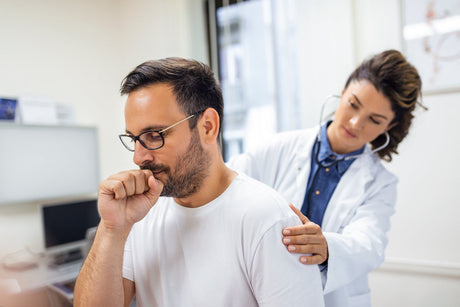Getting older can present new challenges, especially when it comes to maintaining physical health and strength. The concept of "exercise for aging" isn't just about staying active; it's about building strength in your younger years to ensure that your muscle tone remains strong as you age. In this article, we cover the changes that come with aging, and what exercises are suitable for older people.
As our bodies age, they naturally lose muscle mass and bone density. It's a part of getting older, but it's not an irreversible condition. To counter this, strength training becomes a cornerstone of an older adult's exercise regimen. Lifting weights, even light ones, or engaging in resistance training using bands can make a significant difference. It's not just about bulking up; it's about maintaining the muscle strength that keeps you independent and spry.
Flexibility and Balance as you age
Remember those days when you could bend to tie a shoelace without a second thought? As we age, flexibility wanes, and balance becomes a little harder to maintain. Incorporating exercises that enhance flexibility, like gentle stretching, yoga, or Pilates, can help preserve your range of motion and reduce the risk of falls – a common concern in older age.
Exercising for age: where to start
Consulting with Healthcare Providers
Before you jump into any new fitness regime, it's wise to have a chat with your doctor or healthcare provider, especially if you've got existing health conditions or concerns. They can offer guidance tailored to your unique health profile, ensuring your exercise plan is safe and effective.
If you’re suffering from sleep apnea, exercise can help ease your condition by encouraging weight loss and improving overall sleep quality. If you experience COPD symptoms and feel like you can’t exercise, there are still types of activities you can do for your body and your lung capacity.
When customizing your exercise routine, it’s important to:
- Assess your fitness levels
- Set realistic goals
- Incorporate a variety of exercises
- Consider safety tips for older exercisers
Understanding Your Limits
Listen to your body. It's been through a lot and knows its limits. Start with exercises that match your current fitness level and gradually increase the intensity. There's no rush; the goal is steady progress without injuries.
If you are experiencing any pain, especially if you have chronic health conditions, it’s always a good idea to check in with your physician. Learn more about pain management.
What are good exercises for aging?
There are plenty of activities that older people can enjoy, including golf, swimming, and hiking. Here are 5 exercises for an aging body.
Strength Training
Strength training exercises such as lifting weights or using resistance bands can help improve muscle mass and strength. This can help reduce the risk of falls and fractures, improve balance, and increase overall mobility. Simple bodyweight exercises like squats, lunges, and push-ups can be surprisingly effective. They help maintain muscle mass and don't require any fancy equipment.
Resistance Training
Resistance training, such as using bands or light weights, can significantly improve muscle strength. It's about controlled movements that strengthen without putting undue strain on the joints.
Cardiovascular Exercises
Low-impact cardio exercises such as walking, cycling, and swimming are excellent options for older adults. These exercises can help improve cardiovascular health, reduce the risk of chronic diseases, and improve mood. They are also kinder to your joints while still giving your heart a good workout.
Flexibility and Balance
Yoga is a whole-body exercise program designed to align the body, correct muscular imbalances, enhance movement patterns, and create a balance of strength and mobility. Yoga offers improved quality of life to those who practice it. It can help slow the effects of time and mitigate or relieve symptoms of heart issues, diminished lung capacity, decreased bone density, muscle loss, back pain, or an artificial knee. Yoga can also help improve balance and posture. Regardless of your age, conditioning, or ability, it’s never too late to start a yoga practice.
Pilates is an excellent full-body, low-impact method known to align and strengthen the structure of the body. Pilates works with your breath, targeting your smaller and deeper stabilizing muscles. It supports your joints through a balance of strength, mobility, and flexibility. Pilates is a useful method with benefits for both beginners and experienced athletes alike, as well as people in every phase of life, regardless of their age, gender, or ability. Pilates can alleviate or improve the typical symptoms of aging, such as a decrease in strength, mobility, and balance
Worst exercise for aging
While there are lots of exercises to help you age well, some exercises can do more harm than good. Some exercises to avoid if you are aging include excessive cardio workouts, hardcore exercises like CrossFit and HIIT, crunches, and leg extensions. Excessive cardio can cause muscle loss, raise cortisol levels, and lead to overuse injuries. Hardcore exercises like CrossFit can cause fractures and other serious injuries, especially since our bones weaken as we age. Crunches may strengthen your core, but they stress the spine and can cause neck and back pain. Leg extensions can cause muscle imbalance between the quadriceps and hamstrings, leading to knee pain. It’s important to avoid these exercises and focus on low-impact cardio exercises, strength training, flexibility and balance exercises, and other exercises that are safe and effective for older adults.
Exercise for Aging: prepare for the future
Exercise for aging is about more than just staying active; it's about choosing the right kind of activities that cater to the changing needs of your body. It's about making informed choices that enhance your well-being, ensuring that as your body gets older you will still be active and healthy enough to do the things you love. Remember, it's never too late to start, and the benefits are worthwhile.
FAQs
How much exercise is enough to reap these benefits?
The CDC recommends at least 150 minutes of moderate-intensity aerobic exercise per week, plus muscle-strengthening activities on 2 or more days a week.
Can exercise help with mental health?
Absolutely! Exercise is a proven mood booster, thanks to the release of endorphins, and can be a valuable tool in managing stress, anxiety, and depression.
Is it too late to start exercising if I'm already experiencing signs of aging?
It's never too late! Starting an exercise routine can be beneficial at any stage of life, and can significantly improve your quality of life as you age.As a leading supplier of durable and home medical equipment (DME and HME), ApriaHome sources and distributes a wide range of treatment solutions, including CPAP machines, respiratory equipment, and home medical solutions.
We're here to support you as you work toward your improved health and well-being. We strive to meet your ever-evolving healthcare requirements with individualized attention and premium quality treatment solutions.
Looking to add home medical supplies? Browse our premium solutions and let us help you get the most out of every day.
Looking for advice? Our helpful agents are on call at (800) 780-1508 between 8:00 am - 10:00 pm EST daily. Get in touch today.





